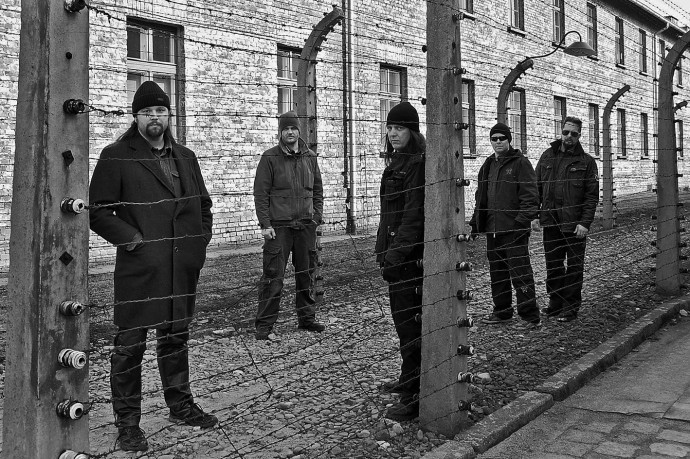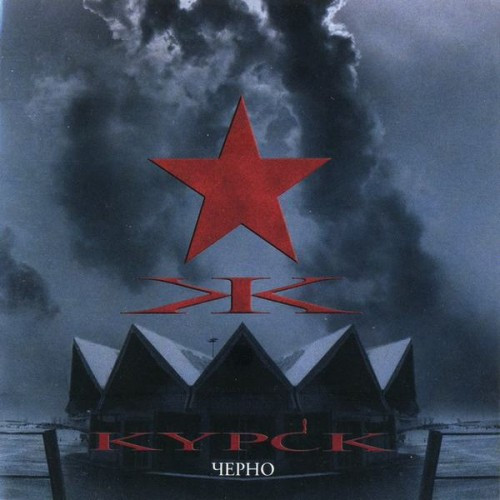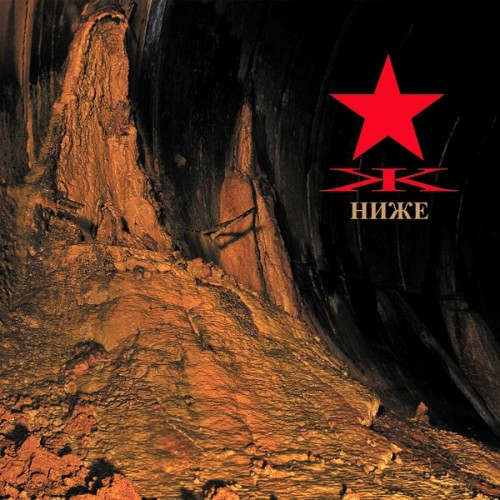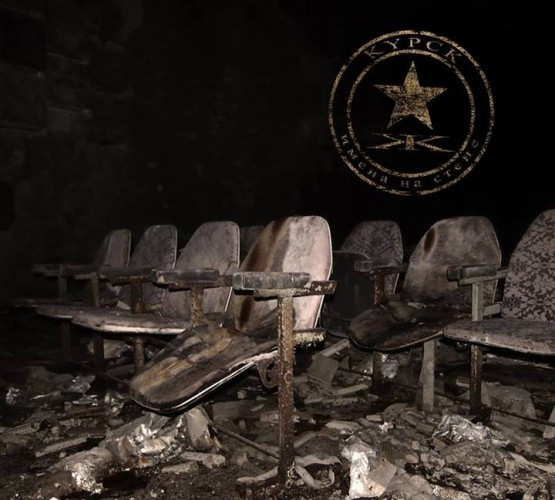(Andy Synn brings us the 53rd edition of The Synn Report, reviewing the discography of KYPCK.)
Recommended for fans of: Crowbar, Ghost Brigade, Pallbearer
Well, it looks like we have just enough time left in this year to sneak in one last Synn Report. But what band should I cover?
Thrashy prog/power metal? Technically twisted Death Metal? Creepy industrialised Black Metal? Razor-sharp Melodeath? Groovy Nu-Metal? (all of these are potential future entries, don’t you worry…)
No, I’m thinking we need to celebrate the death of the year, and the dawning of a new one, with some Russian-themed Doom Metal from Finland. How does that sound?
Formed back in 2007 and naming themselves after the Russian city of the same name, KYPCK (pronounced “kursk”), these Finnish fatalists have distilled some truly deep and deathly Doom and gloom from the historical antagonism between Finland and Russia, grooving and grinding their way through three albums worth of songs dealing with themes of pain and loss and the futility of war.
Чернo – 2008
The band’s debut album kicks off with the atmospheric introduction of “Гидролокатор” (“Depth Finder”), which is soon rudely interrupted by the clanking guitars and booming drums of “Рождество в Мурманске” (“Christmas in Murmansk”), which churns and writhes through a series of roiling riffs and echoing melodies, aided and abetted by Erkki Seppänen’s ravaged clean-sung lamentations.
The intro to “Предатель” (“Traitor”) ups the ante with its militaristic drum beats and mechanical, chugging riffage, before collapsing into brooding, tormented introspection – shifting back and forth between driving heaviness and haunted ambience as the song marches ever onwards.
“1917” is five minutes of creeping despair and perfectly crafted, soul-rending melodic hooks grafted onto a backbone of megalodon riffs and a truly stunning chorus, whilst “Чёрная дыра” (“The Black Hole”) is an almost nine-minute odyssey of rumbling heaviness and seething desperation that chugs and groans and bleeds and burns with frostbitten fire.
“Сталинград” (“Stalingrad”) packs a real heavyweight metallic punch with its earth-shaking rhythmic attack and thrumming, bruising bass-lines, its pounding pace setting the stage for the more melodic, yet no less heavy, impact of “Не прости” (“Do Not Forgive”), which weaves together strands of weeping, joyless melody and monumental, glacial heaviness into one of the album’s absolute highlights.
The grim, heaving riffs and ghost-lit ambience of “Очередные” (“The Usual”) follow, leaking sorrow and poison from every pore, before “Один день из жизни Егора Кузнецова” (“One Day in the Life of Yegor Kuznetzov”) swaggers (and staggers) into view, replete with a brace of brash, groove-laden guitar lines and infectious, insistent vocal hooks, building to a stiflingly claustrophobic conclusion.
The whole album climaxes with the progressively inclined, slow-burning melodic majesty of “Демон” (“Demon”), a truly captivating mix of haunting harmonies, moody and melancholy vocals, and dense, doomy guitars positively drenched in despair.
Ниже – 2011
KYPCK’s second album begins with the echoing atmospheric instrumental of “Гифарус” (“Gifarus”), which ably serves to build the anticipation until the bleakly alluring melodies and anguished vocals of “После” (“After”) pierce the gloom, carried on a current of tar-thick guitars and creaking, skeletal percussion.
The icy, blood-stained beauty of the rather Sentenced-esque “Аллея Сталина” (“The Alley of Stalin”) is a truly mesmerising concoction of misery and melody which showcases the band’s (relatively) softer side, leading into the similarly melodic, yet more spacious and progressive strains of “Чужой” (“Stranger”), nine minutes of piercing, poignant harmonies and esoteric ambience, bolstered by a foundation of barely restrained, doom-laden heaviness.
At first listen it seems as though “Фелица” (“Felitsa”) is set to be another stripped-down and minimalist affair, yet it slowly builds, with crushing inevitability, into a slow-burning procession of thrumming riffs and electrifying guitar leads that carve the gloom into a ghost-like series of somber shapes and shifting shadows. It’s followed by the monolithic doom of “Разрыв” (“Rupture”) — seven and a half minutes of groaning riffs, soaring melodies, and perfectly placed, punishing percussion – and the discomforting, distressing heaviness of “Бурлаки на Волге” (“Burlaks on the Volga”), evoking images of grey skies and grim lives lived out beneath a pitiless cloud of failure and futility.
“Бардак” (“Brothel”) picks up the pace a little, its drunken, priapic swagger interrupted by sudden, staggering halts, before lurching back into heaving motion, and it’s followed by the choppy, down-tuned riffage of “Товарищам” (“Comrades”), whose dismal march through forests of phantom pain and regret is crowned with a simple, yet effortlessly evocative, solo around the song’s mid-point, and another no less moving one at the song’s climax.
The album’s finale is the utterly desolate instrumental track “Вальс смерти” (“Death Waltz”), a slow-motion tragedy of plaintive melody and grandiose metallic doom that drags the listener ever downward into a mass grave of failed hopes and forgotten dreams.
Имена на стене – 2014
At times overwhelmingly oppressive, at others achingly vulnerable, “Пророк” (“The Prophet”) starts the band’s third album in suitably dismal style, layering its dense, chugging guitars and multi-faceted melancholic melodies to chilling effect.
The rippling riffs and angst-ridden harmonies of “Имя На Стене” (“Name on the Wall”) are wrapped around an eerily infectious chorus refrain, a high-proof distillation of pure despair and desperation, while the ominous “Воскресение” (“Resurrection”) has a much more tense and claustrophobic atmosphere, its uneasy hooks infiltrating the listener’s brain in an almost primal fashion even as the gut-level rumble of its doom-laden riffs evokes an almost instinctive response.
“Дети Биркенау” (“The Children of Birkenau”) is a Ghost Brigade-style treatise on misery and anguish that justifies every second of its 7:25 run-time with the crushing weight of emotion on display. During its final third, where the song transforms into something more up-tempo and lucid, it offers up a form of painful catharsis, driving out the darkness with every pulsing beat and electric, eclectic riff.
“Грязный Герой” (“The Filthy Hero”) is a seething stomp of ugly, unforgiving grooves and grim determination, pounding its way relentlessly through a swamp of sludgy guitars and noxious emanations, before the unsettling ambience and grinding gears of “Как Философия Губит Самоотверженных, Бескорыстных Бюрократов” (“As Philosophy Ruins Unprejudiced, Selfless Bureaucrats”) drags the listener kicking and screaming into the black heart of the industrialised age, all clanking, clattering riffs and migraine-inducing bass-lines.
The first minute of “Белорусский Снег” (“Belarussian Snow”) is deceptively ballad-like, leaving the listener unprepared for the booming guitars and juddering drums which appear out of nowhere to shatter the calm. Playing games with the simple quiet/loud dynamic, the song also incorporates a truly captivating chorus refrain, bolstered by teasing touches of lead guitar melody and some brittle, choppy riffage that bristles with nervous energy.
The massive, monolithic riffs of “Всегда Так Было” (“It’s Always Been This Way”) are as stark and unyielding as tombstones, casting long shadows over a barren and desolate landscape, haunted by spectral, psychedelic melodies, while “Этой Песни Нет” (“This Song is Not”) is an intoxicating arrangement of heaving, hypnotic grooves which spread their uncomfortable warmth throughout your bloodstream.
The whole thing culminates in the suicidal beauty of “Трос, Грузовик И Темный Балкон” (“A Rope, a Truck and a Dark Balcony”), melding soaring melody and creeping misanthropy into one grimly effective concoction.





Been following this band since their debut. Great doom with a lot of sludgy riffs in them, also the right amount of melody. Glad that you chose it for the report.
Although I wish I understood what they were singing about. As to why they chose to sing in Russian, given that the ‘antagonism’ between Russia and Finland were there to begin with there is something more to it than that I believe.
I’m confused by what you might consider “something more” to be?
The Finns have a long and storied history with Russia, and their singer is a fluent Russian language instructor. I don’t know how/why there could be something more than that to it!
He’s referring to the fact Russia and Finland had a war as recently as 1938. Lots of bad blood there, certain animosity remains until today.
Any particular songs you’re interested in? I can give you a rough summary of what they’re about. I’m Russian, and I’m a huge fan of the band.
I have seen them live once and had a chance to talk to Erkki, their singer – who has a remarkable command of the Russian language but, most importantly, is one of the best frontmen and singers I’ve ever seen. His charisma, both on and off stage, is unbelievable. He truly cares about the music and about his listeners.
Thank you there B for being considerate. For example a few of their popular singles alleya stalina (anything to do with stalin?) , their latest ‘Imya Na Stene’. Just wanted to know whether they are anti-communist in general, or do just cite specific instances between the conflict, or full on left wing? Just curious about their political leaning, sometimes it does not matter, sometimes it dos. B.
One of the great things about KYPCK is that they, as a band, are not political at all. They do use Soviet-time imagery in their music, but it is really only about aesthetics. You brought up “Alleya Stalina” (“Stalin Alley”), which is a good example – it describes a dream someone (Erkki?) had, which features a place in some town literally called Stalin Alley, and an old man, who screams/rants about this being his place, his home, and how whoever is having the dream is lost, and staring into the abyss. My take on it is, that the song’s about Soviet-raised people clinging to the past (Stalin being the symbol of “the good old days” for many folks), not being able to deal with how the world drastically changed for them, and how they consider the new generation to be doomed.
“Имя на стене” (“Imya na stene”) means “Name on the wall”. A couple of months ago, when this song and “Дети Биркенау” (“Deti Birkenau”) went promo, I pitched them to Islander, and had some real trouble figuring out what this particular song was about. The lyrics are very densely symbolic, but you can make out the protagonist walking around a city in darkness and seeing names on walls. I initially assumed it had something to do with names on a war memorial – they usually feature actual lists of people who died in the war, pretty sure that is the case for war memorials worldwide, not only in Russia. But, after reading a couple of interviews with Erkki, the actual meaning turned out to be far more prosaic – the song’s about wandering St. Petersburg. That city was and is a cultural hotspot, and it has lots of architectural landmarks and houses where famous historical figures lived, which are always marked with stone or metal tablets featuring the name of the person and years that he spent living there. The “names on walls” are literally those tablets.
To circle back to the idea with which I started – KYPCK may be a bit ham-fisted with their visual references, but the lyrics are quite sophisticated for a metal band. They deal with a huge variety of subjects, but the main idea seems to be showcasing an outlook on life and the world through the prism of Russian history and culture, both old and modern. And they are even more interesting because they are written by an intelligent, Oxford-educated sympathetic foreigner – it offers a whole new perspective. There are people in Russia who mock Erkki for having a subtle accent, and his lyrics for awkward phrasings here and there, but fuck those guys, because these little quirks give the music even more soul – we use a couple of their riffs for warm-up before band practice, and I always end up mimicking his pronunciation, because the music loses charm without it.
Much much thanks for writing this B. Clears up a lot of things now. I was always of the belief that the band was of a very political nature (which is not a bad thing at all for me personally), and now I guess I was wrong all the time. The symbolism might have led me to believe so, for instance the presence of the ‘red star’ on most of their album covers was hinting either at their inclination to the commie past or the problems that it brought about. And like you said that it indeed must connect with the old and the past of Russian history, the political upheavals, the great literary scholars (‘names on the wall’). Probably so much that it’s less likely to be about the Finland – Russian strife and more of a love for Russian history and culture.
Once again thank you for writing this.
You’re welcome! Glad it was interesting.
And yes, it is all really about sincere love for Russian history and culture. Erkki studied Russian linguistics and literature in Oxford, plus he worked quite some time at the Finnish embassy in Russia. The lyrics are very consistent with his personal history. I don’t remember the Finnish-Russian strife to ever be brought up in KYPCK lyrics at all.
P.S. It’s been a wordy exchange of posts, and the “stay a while, and listen!” joke still remains to be cracked. What gives?!
Thanks again my friend. This wordy exchange was indeed worth it and thanks for taking the time to type all that down. Clarity’s been achieved. Erkki lives and breathes Russian indeed.
P.S. Oh…but.. but.. i haven’t put my robe and grim face on! hehe.
But I thinks its time I..
“Stay(ed) awhile and listen(ed)”